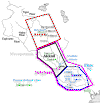| |
Assyria
  
 

Assyria, also at times called the Assyrian Empire, was a
Mesopotamian kingdom and empire of the Ancient Near East that
existed as a state from perhaps as early as the 25th century BC (in
the form of the Assur city-state) until its collapse between 612 BC
and 605 BC; thereby spanning the periods of the Early to Middle
Bronze Age through to the late Iron Age. This vast span of time is
divided into the Early Period (2500–2025 BC), Old Assyrian Empire
(2025–1378 BC), Middle Assyrian Empire (1392–934 BC) and
Neo-Assyrian Empire (911–605 BC). A Semitic-speaking realm, Assyria
was centred on the Tigris River in Upper Mesopotamia, a region which
covered, in modern terms, northern Iraq, northeast Syria, and
southeast Turkey, with fringe areas of northwest Iran.
The name "Assyria" originates with the Assyrian state's original
capital, the ancient city of Aššur, which dates to c. 2600 BC —
originally one of a number of Akkadian-speaking city-states in
Mesopotamia. In the 25th and 24th centuries BC, Assyrian kings were
pastoral leaders. From the late 24th century BC, the Assyrians
became subject to Sargon of Akkad, who united all the Akkadian- and
Sumerian-speaking peoples of Mesopotamia under the Akkadian Empire,
which lasted from c. 2334 to 2154 BC. The Assyrians created powerful
empires of their own in several periods. Making up a substantial
part of the greater Mesopotamian "cradle of civilization", which
included Sumer, the Akkadian Empire, and Babylonia, Assyria reached
the height of technological, scientific and cultural achievements
for its time.
Starting around 911 BC, the Assyrians began campaigning to expand
their third empire. They conquered, extracted tribute, and built new
fortified towns, palaces and temples. By constant warfare the
Assyrians created an empire that stretched from eastern Libya,
Egypt, and Cyprus in the East Mediterranean to Iran, and from
present-day Armenia and Azerbaijan in the Transcaucasia to the
Arabian Peninsula and southern Egypt in the south.
After the Assyrian Empire fell at the end of the 7th century BC,
Assyria survived as a geopolitical region until the mid-7th century
AD. During that time the region of Assyria was ruled by foreign
powers such as the Achaemenid Empire, Seleucid Empire and Parthian
Sasanian Empires. Between the mid-2nd century BC and late 3rd
century AD an Assyrian revival occurred, during which a number of
independent Assyrian states such as Adiabene, Osroene, Beth Nuhadra,
Beth Garmai, Hatra (and perhaps Assur itself) arose. The final part
of this period saw Mesopotamia become a major centre of Syriac
Christianity and the birthplace of the Assyrian Church of the East
(including its offshoot, the Chaldean Catholic Church) and Syriac
Orthodox Church. Greeks, Romans, and subsequently Arabs, Selcuk
Turks and Ottoman Turks also took over control of the area.
The region of Assyria fell under the successive control of the
Median Empire of 605 to 549 BC, the Achaemenid Empire of 550 to 330
BC, the Macedonian Empire (late 4th century BC), the Seleucid Empire
of 312 to 63 BC, the Parthian Empire of 247 BC to 224 AD, the Roman
Empire (from 116 to 118 AD) and the Sasanian Empire of 224 to 651
AD. The Arab Islamic conquest of the area in the mid-7th century
finally dissolved Assyria (Assuristan, a region which by then also
included the former Babylonia) as a single entity, after which the
remnants of the Assyrian people (by now almost all Christians)
gradually became an ethnic, linguistic, cultural and religious
minority in the Assyrian homeland, surviving there to this day as an
indigenous people of the region.





|
|


















_Central_Palace_Tiglath_pileser_III_728_BCE_British_Museum_AG.jpg)


.jpg)



